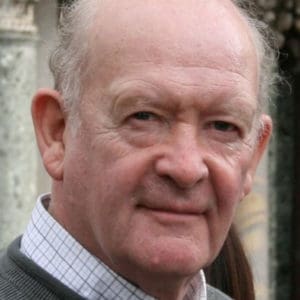MINI-COURSE ON PRAYER
SECTION 2 CHRISTIAN MEDITATION
Part 19 – A Lesson From My Father
Editor’s Note: in part 18, David Torkington discussed the need to carve out time and space to pray, and how we know God through love, not through knowledge alone. This week he reminds us that those short, fervent prayers said throughout the day saturate our lives with love.
I never spoke to my father about his spiritual life, or my own for that matter, but I know that after reading a book on the Desert Fathers he became very interested in their spiritual teaching. It must have been the way they offered their day and everything in it to God that affected him most, because after his death I found a quotation from John Cassian on the final page of his missal which helped him to keep his morning offering on course throughout the day. It was a short prayer recorded in the works of John Cassian. It seems my Father used it throughout his day whenever he was in need. The prayer was simply, “O God come to my aid, O Lord make haste to help me.” John Cassian said that the prayer was taught to his disciples by Abbot Isaac and later used by St Benedict with which to begin the divine office throughout the day, as it is still used today. Under this little prayer, my Father had copied out the following words from Abbot Isaac, written for the benefit of his followers:
“O God come to my aid, O Lord make haste to help me.”
“You must continually use this prayer in your heart, whatever you are doing or whatever office you are holding, or journey you are undertaking; in adversity that you may be delivered, and in prosperity that you may be preserved. You should be so moulded by the constant use of it that when sleep comes you are still considering it so that you become accustomed to repeating it even when you sleep. When you awake let it become the first thing that comes into your mind, let it anticipate all your waking thoughts. When you rise from your bed let it send you down on your knees, and thence send you forth to your work, and let it follow you all through the day.”
Abbot Macarius used to tell his disciples to say simply, “Lord to the rescue,” or call upon him by name by using the holy name ‘Jesus’ whenever they were in danger of losing their way or forgetting what they were about. Abbot Macarius was believed to be the originator of the Jesus Prayer. Later it developed into the prayer as we know it today, which was originally composed by Saint John Climacus, “Jesus son of God have mercy on me a sinner.” These short prayers, were not only used by the Desert Fathers, but have been used continually throughout subsequent centuries. They have always been used to help Christians keep their attention fixed on their calling throughout the day and help them when distractions or temptations threaten to overwhelm them. One of my mother’s favourite little prayers that helped her throughout her day was, “Jesus mercy, Mary help.” My primary school teacher, Miss Holt, taught us all to say, “Sacred Heart of Jesus I put my trust in you.” During the First World War Fr. Willie Doyle, SJ used to give his troops his ‘pink pills’ to use in the battle ahead. They were short pithy prayers easy to remember that they could repeat over and over to support, inspire and sustain them. We might not have to face such terrible physical battles each day, but we do have to fight very many spiritual battles, so we too have need of his ‘pink pills’. He encouraged his men to choose their own so that they could be personalised to their own individual needs. I’ve made my own ‘pink pills’ – why not make some for yourselves?
A lesson from my Father
Morning prayer was not the beginning and end of daily prayer, for it was the custom of the early Christians to pray five times a day too, as Jesus had done. It is still possible for us to do this, as I believe my father did. I remember asking him why he had put little stickers on his wristwatch. One was pointing to nine o’clock another to twelve o’clock, and the third to three o’clock. He merely said it was a little device to help him remember something. In earlier times when Christian Europe was predominantly rural, the Angelus bell that pealed three times a day called everyone to prayer wherever they were and whatever they were doing. This was a world that neither my father nor his forbears had known, for unlike my mother they were all Protestant. His parents were converts and like them, he was always reticent to speak about his faith. When it came to the spiritual life he was an intensely private man who found it difficult to speak about it, let alone his own. However, one thing I know for certain was that he always tried to find some time each day, in addition to all else, to enter into what my mother called his inner garden shed for his daily prayer.

Night Prayer
Here is a suggestion that you might find helpful from an ancient tradition traced back to the Desert Fathers. When you are in bed say a short prayer and repeat it slowly and prayerfully. It may simply be the word, ‘Jesus’, or the full Jesus prayer, “Jesus Son of God, have mercy on me, a sinner”. This prayer and others like it came to be used most particularly in the Eastern Christian Church, with slow rhythmical breathing. It was not a device for relaxation, but for reminding the believer of the all-pervading action of the Holy Spirit. The ancient Jews believed that their breath was their life-principle, their spirit, so naturally, they believed that God’s breath was his life-principle, his Spirit. As a mark of respect, God’s breath or his Spirit came to be called the Holy Spirit. So, deep rhythmical breathing that often accompanied short prayers of the heart, helped remind Eastern Christians of the incoming Spirit who dwelt within them with ever-increasing power the more they prayed. It can be a reminder to us too, particularly when preparing for sleep.
Far More Effective than Sleeping Pills!
The prayer “Come, Holy Spirit” can accompany the slow intake of breath followed by the prayer, “Conceive Christ in me”, as we breathe out. With the next breath pray again “Come, Holy Spirit” followed by, “fill every part of me”, and again with the next breath, “Come, Holy Spirit”, followed by, “bring Christ to birth in me”. Then the three prayers could be repeated again and again. Other short prayers could be used like “Come, Lord”, or “Come, Lord Jesus”, or whatever short prayer you feel helps you best. When this practice becomes a habit it can be far more effective than sleeping pills, and there are no side effects either!
However, this sort of prayer need not be restricted to preparation for sleep, for once you have become used to using it at night, you can use it at other times of the day too. When, for instance, you are waiting for a bus, for the train or the plane, when you are sitting in a waiting room, waiting for the doctor, the dentist or the consultant, or when you are waiting for a phone call, for the plumber, or for the electrician to come. Instead of letting frustration take possession of you, use the time to let the Holy Spirit take possession of you. Then, instead of anger, you will be filled with peace. At the end of his book, The Count of Monte Cristo by Alexandre Dumas, the author says that all the wisdom in the world is contained in just two words – ‘waiting’ and ‘hoping’. If we learn how to wait while doing all we can to invite the Holy Spirit to take possession of us, then before too long all our hopes, all our deepest desires and yearnings will be realised. For, as the Holy Spirit suffuses our love with his love, then that love can take us up into Christ where we are able to contemplate the Father, in, with and through him. Then, we will be able to experience brief moments of heavenly peace in this world, as we are beginning the journey to experience the fullness of heavenly peace in the next, and for all eternity.
When at the end of the day you have finished trying to pray as best you can, be at peace. You have done your best, now leave the rest to God, remembering the words of St Padre Pio:
“Pray, trust and don’t worry.”
These ideas are developed further in my two major works on prayer – Wisdom from the Western Isles and Wisdom from the Christian Mystics, and Wisdom from Franciscan Italy that show how deep contemplative prayer grows to perfection.
+
Photo credit: Igor Malytskyi on Unsplash



